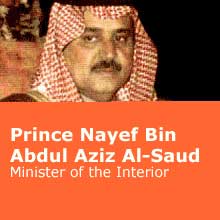Since 1975, Prince Nayef has headed Saudi Arabia’s Ministry of the Interior, which oversees the nation’s civil security forces and maintains stability within the kingdom. As the primary threats to the Saudi government have shifted from external countries such as Iraq and Iran to internal volatility, power has shifted subtly from Prince Sultan’s military to Nayef’s interior service forces.
Prince Nayef’s politics are aligned with the conservative Islamic tenets that underpin Saudi Arabian society. The House of Saud is historically bound to a particularly devout platform of Islam based upon the teachings of the 18th century cleric Muhammad ibn Abd al-Wahhab, who was an important ally of Saud family patriarch Muhammad bin Saud. While Crown Prince Abdullah has begun to advance reformist policies, Prince Nayef has garnered political clout from conservative Saudis and courted support for the Saud regime with right-wing religious factions. In what some viewed as a tough stance toward Western power, Nayef denied the U.S. access to several Saudis implicated in the 1996 bombing of Khobar Towers in Dhahran, which killed 19 American servicemen. More recently, Nayef has been accused of turning a blind eye to the activities of radical clerics who wish to cleanse the Islamic holy land of non-Muslims. Progressive Saudis criticize hardliners like Nayef for seeking to uphold the kingdom’s strict Islamic traditions at the expense of its citizens and its future.
An influential player within the House of Saud, Prince Nayef’s rank within the family rose even higher with the death of his brother King Fahd. Younger than Crown Prince Sultan and an active participant in state affairs, Prince Nayef may yet get his chance at the Saudi throne.
- Previous: Prince Salman Ibn Abdul Aziz
- Next: Prince Khalid bin Sultan bin A...



